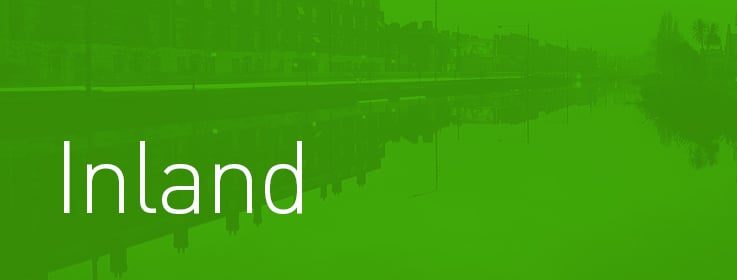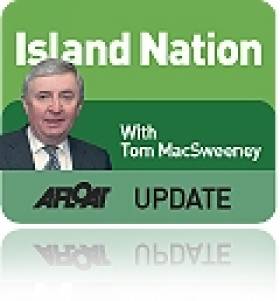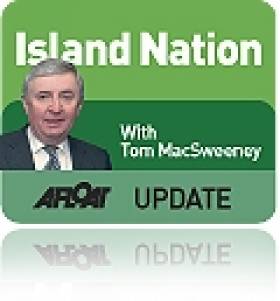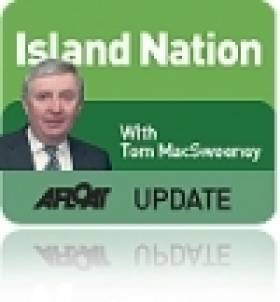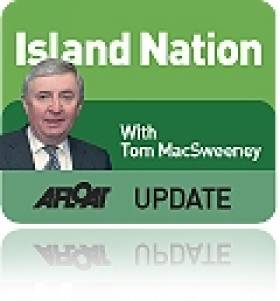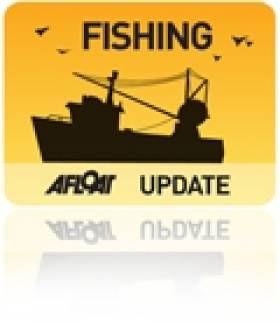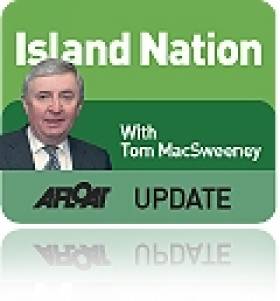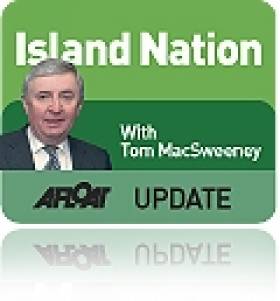Displaying items by tag: Island Nation
Going it Alone – or Short-Handed!
In the late 1970s he wanted to develop a "relatively affordable" solo offshore race in contrast to the trend towards bigger and more expensive boats in other trans-ocean races, such as the OSTAR.
With its strong maritime tradition it was appropriate that Plymouth should be at the forefront of the initiative. It was from there in 1620 that the Pilgrim Fathers sailed for the New World and established settlements in what became the USA. And it was on Plymouth Hoe that Sir Francis Drake is said to have played a game of bowls before setting off to engage the Spanish Armada in battle in 1588.
From Bob Salmon's initiative the Mini Transat was developed, the yachts limited to 21-feet maximum.
It is the smallest Open Class trans-ocean race and has been a breeding ground for professional ocean racers. There is now a move to get Ireland involved. This reflects the growing interest in short-handed sailing here despite the attitude of the Government which has rules in place that are regarded as discouraging this type of racing.
The Irish Double and Solo Racing Group was launched last year to develop a vibrant community of Irish solo and double-handed sailors as well as establishing a regular sailing calendar here.
In the past two years Irish sailors achieved remarkable success in short-handed ocean racing. Damian Foxall won the double handed Barcelona World Race with French co-skipper Jean Pierre-Dick on their Open 60 PAPREC-VIRBAC. Cobh man Barry Hurley won his class and finished 4th overall in the OSTAR (Original Single-handed Transatlantic Race) in his JOD 35 DINAH. Besides these victories there has been a large increase in the number of Irish sailors participating in solo and double-handed sailing. Several are travelling to events in the UK and France where this type of sailing is firmly established.
Now Michael McKeon a member of the Double and Solo Group is the man spearheading interest in the Transat here.
He has 30 years' sailing experience and, following the success of a series of "Mini open days" which he ran in Dublin aboard his own boat, HYPOMENE, Michael wants to rally "interested parties" to help campaign it as the 'Irish Mini' during the 2011 season and create the Mini Transat Class in Ireland.
"The sailing level is from pure amateur up to professional," he says. "The Mini gathers an average of 500 subscribers, most of them competitors coming from all kind of professions, from the carpenter to the engineer, the nurse to the steward, the journalist to the professional skipper. Anyone interested in the Mini 6.50 class and in sampling short-handed racing the 'French way' is welcome."
More information is available from Michael at: Email: [email protected] or Mobile 086-8494924
• This article is reprinted by permission of the EVENING ECHO newspaper, Cork, where Tom MacSweeney writes maritime columns twice weekly. Evening Echo website: www.eecho.ie
Check out our Solo sailing stories here
Would You Pay to Watch Sailing?
There are those who don't like sailing – and even some in the sport itself – who have described watching a sailing race as "about as interesting as watching paint dry. While exciting pictures have been available from the Volvo Round the World Race and match racing has proved watchable, these were exceptional highlights compared with the more mundane aspects of yacht racing. Raising public interest in the sport has been a permanent difficulty.
The Olympic Games have fared no better. The last Olympics in China were difficult for sailing where the racing was not regarded as of sufficiently high quality, courses were perceived as often poor and there were even difficulties in finding enough clear water at times due to silting and other problems.
With tickets due to go on sail in two month's time for the London Olympic Games in 2012, controversy is flaring over a decision to impose charges to watch sailing.
The 2012 Games will be the first in Olympic history to charge spectators for sailing races, with temporary seating being provided for up to 4,600 paying customers at Weymouth's Nothe Gardens, a local beauty spot which overlooks one of the racing areas at Newton's Cove. Weymouth and Portland Council received official notification about the plan a week before Christmas. This was more than two months after the London organising committee, Locog, announced ticket prices for the Games, including sailing.
The spectator experience at previous Games has been confined to a glimpse of sails through a pair of binoculars, but by bringing the action close to shore, Locog believes it can turn sailing into an exciting spectator sport.
They are hoping that ticket sales will be encouraged by the introduction of new events such as women's match-racing — a series of 20-minute head-to-head races between two boats. This will begin with a round-robin phase before turning into a knockout competition and is intended to form the core of the programme on the Nothe course. It will be supplemented by races involving two of what are regarded as spectacular classes - including the 49ers and the windsurfers.
In the second week of the Games, the course will play host to the final medal races in all boat classes.
This concept of bringing the sport to the fans onshore has the full backing of the International Sailing Federation, which will be hoping for capacity crowds in the temporary stands, where spectators will be asked to pay up to stg£55 each to watch the sailing.
However, local people in Weymouth and Portland are angered by the intention to turn their public park into a ticketed venue. The Council has accused the organisers of not discussing their plans in advance and local councillors claim people are outraged that they will be barred from the park for several weeks.
Locog has defended its decision to sell tickets, saying that, for the first time, sailing will be presented as a true onshore spectator experience, which the International Sailing Federation is keen to develop. The organisers also cite safety concerns, with a ticketed venue allowing them to predict crowd numbers. They insist the move is not motivated by financial gain, but that is, clearly, being questioned.
For those unwilling to pay, there will still be one or two free vantage points near Newton's Cove as well a free site with a big video screen and stage on Weymouth Beach.
Sailing competitions will take place on five courses but only at Newton's Cove will spectators be able to watch from land with the naked eye. Tickets, which will go on sale in March, will range from stg£20 for preliminary races to stg£55 for medal races. Discounts will be offered for children and over-60s.
Locog said councillors were invited to a meeting about Nothe Gardens in October. It added that there would be a public consultation later this year prior to submitting a formal planning application for the use of the park for charged viewing. It will be interesting to see how the Council reacts to that application!
One thing the controversy is doing is, at least, is to highlight the sailing events!
• An interesting sidelight about public interest in sailing is that, while sailing has difficulty in getting television coverage, a total of 506,000 people watched USA TV personality, Oprah Winfrey and the star of the film, 'Master and Commander,' Russell Crowe when they presented a sailing programme from Sydney Harbour.
- This article is reprinted by permission of the EVENING ECHO newspaper, Cork, where Tom MacSweeney writes maritime columns twice weekly. Evening Echo website: www.eecho.ie
Giving Away a Billion from the Sea
I had to read the figures twice to make sure that I was seeing them correctly. The second reading made me even more angry than the first.
They were, at last, a definitive figure of how much the stupidity of Irish politicians and the ignorance and disregard of the maritime sphere by the Government have cost this nation – over a billion Euros in one year.
There is no way the Government can weasel its way out of this revelation, nor any excuse the un-named civil servants responsible can make to avoid the accusation that this is a massive economic waste.
The Marine Institute is the Government's own respected authority on maritime affairs, the voice of the State on marine research and it has valued the total available catch of fish off Ireland last year at €1.18 billion, for a total of 994,155 tonnes.
That is an enormous figure, indicating huge potential wealth for this cash-strapped nation in the middle of an economic disaster. But of this total value of seafood, Ireland was only entitled to catch €0.19 billion. Foreign fishing fleets had exclusive rights to take the rest of the fish from Irish waters.
No wonder I had to read the figures a second time to make sure I was seeing them correctly at a time when the value of our food exports has been shown to be one of the top earners for the nation. How much more could have been earned if Irish fishermen could catch all that fish and have it processed in Ireland, creating onshore jobs in ancillary businesses as well as at sea?
The total value for 2010 could be even higher than €1.18 billion because the Institute prepared its figures in advance of the annual fisheries negotiations in Brussels in December. Ireland as a nation and the country's fishing industry in particular are likely to have lost out even more heavily to other EU countries.
Effectively, Ireland handed over around €1billion of its natural economic resources to other EU countries. Mark McCarthy, Editor of The Marine Times, the national fishing industry paper, described the figures as "truly frightening."
"This is a nation with some of the richest fishing grounds in the world where the coastal communities are being financially starved and frustrated through their inability to catch their own fish, because they are not allowed to do so."
It is hardly any wonder that Irish fishermen, forced to tie up their boats at the quaysides of Irish fishing ports and watch as foreign vessels unload into those ports, are bitter and frustrated.
Ebbie Sheehan of Castletownbere, Chairman of the Irish Fishermen's Organisation, asks why fishermen are "so badly treated when we look at the economic situation today?"
The Marine Institute, our national maritime scientific and research organisation, says that its estimate of the value of fishing opportunities in Irish waters is "conservative" and that, in order to prepare the figures in early December, it based them on 2009 values
That would make the total value even higher and the Institute pointed out that of the total catch of 994,155 tonnes, Ireland's fishermen were entitled to take only 18 per cent of the catch. This was only 16 per cent of the total value.
"These figures exclude valuable inshore fisheries, such as lobster and whelk which are not currently managed by total allowable catches within the Common Fisheries Policy," the Institute pointed out.
As Mark McCarthy described it, when one considers the importance of using our natural resources for the benefit of Irish people and the failure of our political leaders to see and understand this, what has been revealed is "truly frightening".
- This article is reprinted by permission of the EVENING ECHO newspaper, Cork, where Tom MacSweeney writes maritime columns twice weekly. Evening Echo website: www.eecho.ie
Remembering Seafarers Who Saved the Nation
City Quay in the centre of Dublin can be a cold place when the wind whips upriver from the open sea.
There was a 'bite' in the wind as I stood there in late November last year, recording the sounds of remembrance. Men, women and children stood in front of a monument where, on most days, traffic pours past and the great majority of people in those vehicles may not realise they are passing a hallowed spot which remembers men without whom this nation would have ground to a halt. This nation may be in a state of "economic war" at present, it was in a real state of war when those men died.
Every year, on the second last Sunday of November, this gathering takes place, when the men of the Irish mercantile marine who lost their lives at sea during the Second World War are remembered. Mass is celebrated in the City Quay Parish Church. Then there is a short walk to the Seamen's Memorial where wreaths are laid. That is followed by tea, coffee and a chat in the parish hall where it is a time of memories for former seafarers and their families. Friendships are renewed as the "family of the sea" gathers. In the afternoon, there is another Memorial Service St. Patrick's Cathedral.
These are poignant occasions which, in recent years, have been extended to embrace, remember and honour all Irish seafarers who have died at sea. The Maritime Institute of Ireland organises the event. Its Cork Branch also holds a remembrance service in November.
The month of November is an important one in the history of Irish maritime affairs.
It was on November 14, 1984 that the then Irish Government, a Fine Gael/Labour Coalition delivered a shattering blow to the Irish maritime industry. They put the national shipping company, Irish Shipping, into liquidation.
Those who took that decision have since put distance between themselves and the maritime sector. Garrett Fitzgerald was Taoiseach; Alan Dukes was the Minister for Finance in the Fine Gael/Labour Coalition Government which made that controversial decision, putting the first Irish State company into liquidation. Seafarers who had rallied to the call to help save the nation when the company was set up in World War Two were abandoned to their fate. Politicians did not want to remember that, at a time when neutral Ireland was being denied vital supplies by warring nations, seafarers saved the nation from disaster. The politicians who ruled the nation in 1984 abandoned them.
Shortly after they abandoned Irish Shipping, the Government was quick to rescue Allied Irish Banks and protect shareholders over the consequences of rash investment in insurance. Banks were more important than seafarers. It seems that not a lot has changed today in the attitude the Government takes towards banks, in comparison with the way it treats the people of this island nation.
• The Annual National Commemoration Services for Irish Seafarers will be held at 11.30 am this Sunday, November 21, in the Church of the Immaculate Heart of Mary, City Quay, Dublin. Wreaths will be laid afterwards at the Irish Seaman's National Memorial on City Quay. There will also be a memorial ceremony of Evensong at 3.15 pm in St. Patrick's Cathedral, Dublin.
• This article is reprinted by permission of the EVENING ECHO newspaper, Cork, where Tom MacSweeney writes maritime columns twice weekly. Evening Echo website: www.eecho.ie
READ MORE ISLAND NATION BLOGS HERE
Living Beyond Our Means
That is not a title referring to the current economic situation, though it is certainly apt in that regard. I am using it to refer to the fact that as humans we live on relatively small pockets of land on this planet that is dominated by the oceans upon which we depend for life. So much damage is being done to those oceans that 600 marine scientists this week issued a sombre warning:
"It is well past the time to get serious about measuring what is happening to the seas around us."
I was looking this week at an interesting sight, an image of the Earth taken from outer space in which our planet appears as a globe, dominated by a huge drape of blue hues broken up by irregular patches of brown and green, with swirls of grey and white above them. The blue are the oceans, the patches of brown and green the land and the swirls of grey and white the clouds. It made me think that, if life had evolved on another planet and scientists from there were looking at Earth, they would see it as a water planet, dominated by the oceans which cover over 70 per cent of its outer surface.
The oceans are what set Earth apart from other planets in the solar system. They contain over 324,126 cubic miles of water, an enormous quantity of liquid upon which life on the planet depends. We humans, who lack the ability to live totally in water, who do not possess the gills with which marine life is equipped, who are land-bound, air-breathing organisms, have forgotten how unrepresentative is our perspective of land in relation to the oceans. They occupy two-thirds of the world on which we humans live and which we believe was made for us. Yet, there is much more life in the seas. Isn't that an interesting thought, particularly as human life continues to abuse the oceans?
POGO is an organisation linking 80 per cent of the world's institutions studying the oceans. The "Partnership for Observation of the Global Oceans" was created by leaders of the world's major oceanographic institutions. One of its major aims is to reach out to the public, creating more awareness of the seas. It has now established 'Oceans United,' an international forum intended to become 'The Voice of the Oceans,' sharing observations, knowledge and information for the benefit of humanity which depends for its continued existence on the survival of the oceans.
The 600 marine scientists who issued that sombre warning are members of 'Oceans United.' They have called for an integrated global ocean observation system which would monitor the entire ocean surface:
"The situation is that serious. Every country in the world needs to unite, irrespective of their differences, because the ocean surface is now more acidic than ever before and this will affect life on our planet."
The danger from this rising trend is that it will affect the basis of life in the sea – the plankton which are at the base of the global marine food chain. This is not a remote, ethereal issue. Scientists are concerned that the origins of recent world catastrophes such as the floods in Pakistan and summer heat waves and forest fires could be traceable to effects on the oceans as they grow saltier, hotter, more acidic and thus less biologically diverse.
• This article is reprinted by permission of the EVENING ECHO newspaper, Cork , where Tom MacSweeney writes maritime columns twice weekly. Evening Echo website: www.eecho.ie
Mindless Destruction on my 'Lady of the Water'
I am in a somewhat depressed mood writing this week’s column. On Sunday afternoon I boarded my boat on its mooring near the Royal Cork Yacht Club in Crosshaven and what I saw destroyed memories of a pleasant summer sailing season. SEASCAPES had been attacked by thieves and vandalised inside.
It is depressing to think that a group of thieves sat inside my boat for some time. Not satisfied with stealing electronic and other equipment, a plotter, binoculars, flares, even personal items such as sunglasses, sailing hats, gloves, they smashed bulkhead equipment which they could not remove. A barometer and clock were destroyed, adding to the damage caused when the cabin door was broken open.
I can understand how people feel when their homes have been vandalised. This was my “home on the water” during the summer when we sailed along the West Cork coastline. Now it has been defiled by unknown people by persons who must have some boating experience, some maritime knowledge, because they had to use a boat of their own to get onto mine.
Are they amongst the “family of the sea” about which I have written and spoken so often? How can people who have any affinity with the sea do so much damage to a vessel of the sea, I ask myself.
I feel sorry for the boat, that she was undefended against those who attacked her. I feel responsible for what she has suffered, because I was not there to help her as she helped me through many experiences, through bad weather and testing times. These thoughts that come to mind in what I know is a useless raging inside me, but I feel hurt, upset, angry, emotions that are mixed as I write. It is possible to understand theft, but it is very hard to accept mindless vandalism against my undefended ‘lady of the water’ with whom I have shared so much time and energy in moments of joy and of sadness, who looked after me as I slept aboard when she swung to her anchor in coastal harbours.
It was only last week that the Irish Sailing Association warned that thieves were targeting boats and marine equipment. Take care of yours. I have notified the Gardai and they are investigating.
This shall not dissuade me, depressed as I am this week.

Seascapes - vandalised on her moorings in Cork harbour. Photo: Bob Bateman
• This article is reprinted by permission of the EVENING ECHO newspaper, Cork , where Tom MacSweeney writes maritime columns twice weekly. Evening Echo website: www.eecho.ie
More Irish International Success
It is great to report more Irish success on the world sailing scene, where our sailors have done well this season, lifting the country’s reputation internationally.
SCHULL will stage the Youth World Team Racing Championships next year, which is a huge international recognition of Irish ability at organisational, as well as performance level, while a Kinsale Yacht Club team has won a top international regatta.
The decision by the world sailing authority, the International Sailing Federation, to award the team racing event to the West Cork village is a strong international recognition of the achievements of the Fastnet Marine and Outdoor Education Centre which was established at Schull Community College in 1997. The event will be raced in TR 3.6 dinghies, a one-design boat purpose-built for team racing, sailed by a crew of two. Organisational work is underway at Schull and a formal announcement of plans for the event will be made next month. It is expected to cost up to €200,000 to stage. At least 20 teams from around the world will take part.
This is also a boost for youth sailing and for team and match racing which have been increasing in popularity amongst younger sailors. The Irish Sailing Association’s Women’s Match Racing Championships were held at Kinsale Yacht Club last weekend and were won by a team led by Laura Dillon from Howth YC. The next match racing event will be the ISA’s Open Championships also to be staged at Kinsale, where racing will be from the 23rd to 25th of this month. It is approved by the International Sailing Federation as a Grade 3 event which gives world rankings to Irish competitors.
The annual general meeting of Match Racing Ireland, which has been given formal recognition by the Irish Sailing Association, will be held in Kinsale YC on October 23. In conjunction with the championships, members of the association will review progress made in developing match racing.
CIT Cork won the Student National Championships sailed at the RCYC, qualifying them for the Student World Cup next year. Six college teams took part. The team was skippered by George Kennefick.
Olaf Sorensen from Kinsale Yacht Club, crewed by Martin Payne and Shawn Kingston achieved another international success for Ireland at Saint Tropez in the 2010 Dragon Regatta, winning the eight-race highly-competitive event. It was sailed over two days during which the 48-boat fleet, drawn from several countries, faced a wide variety of wind and sea conditions.
Sailing Dragon IRL 207 “Christianna” in a competitive fleet where there was little separation amongst the top boats, the Kinsale crew held the lead after the first day of racing, closely followed by two Russian boats. In the final day’s racing, with winds of up to 25 knots and big seas, they held onto their position to take the event overall, with Russia second and France in third place, securing another Irish win on the international scene.
Irish sailors have had some great victories overseas this season, lifting the reputation of the country.
-
This article is reprinted by permission of the EVENING ECHO of Cork where Tom MacSweeney writes maritime columns twice weekly. Evening Echo website: www.eecho.ie
New Safety Regs Anger Fishermen
Success at Last!
The world trophy for offshore cruiser racing is in Irish hands and Cork has dominated the successful assault on the Commodore's Cup in the hallowed waters of Cowes, centre of British yachting writes Tom MacSweeney.
Several times in previous years the Irish team were favourites, leading the event, with the cup seemingly in their grasp, but were beaten on the last day of the event. This year they led from the opening day. Maintaining their lead to the finish after five days of racing.
Putting just one team of three boats into the competition this year proved the best approach. Like other competing nations such as the UK and France, Ireland had entered previously entered several teams. But the result was internal rivalry that did not bring overall Irish victory.
On Saturday last as the Commodore's Cup fleet of 30 boats, representing 10 nations, headed into the Solent off Cowes for the final day's racing, Ireland was again in the lead. The crews of the Irish team's three boats - Antix, Marinerscove.ie and Roxy 6, were conscious of what had happened to their predecessors and how victory had been snatched away on the last day.
Throughout the week they had built a commanding lead, each of the team boats achieving top fleet positions racing in three different classes. It seemed they were almost certain to win the cup, but those thoughts were being forced aside, almost as if concentrating on them might jinx the final outcome.
With the team boats all from the Royal Cork, one competing in each class, the sailors all knowing each other, there was to be no repeat of previous years. Then there had been internal skirmishing between the several Irish teams on the final day, jockeying for positions, but seemingly focus to bring overall victory.
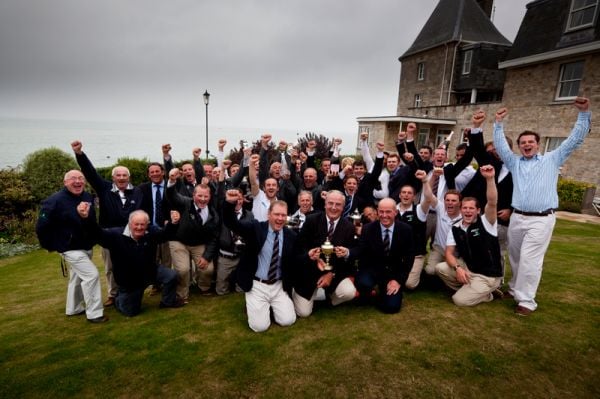
Ireland celebrates victory in Cowes last weekend. Photo: David Branigan
There was plenty of skirmishing and jockeying with opponents on the start line for the final race last Saturday when one French boat tried to protest Antix out of Class 1 in an incident before the start. Anthony O'Leary, skippering Antix, kept his cool and took a penalty time turn allowed under the rules, avoiding what could have been a messy protest. The crew of Antix sailed her so well that she made up lost time at the start during the race. When the French protested at the end of the race, they lost out, having overlooked that Antix had taken the penalty before the race started
Sweet justice for an Irish team when one remembers what happened in another world cup sport!
Strong, gusty winds, dominated the final day, but all three Irish boats sailed well. Antix finished second in Class 1, while Dave Dwyer's Marinerscover.ie revelled in the conditions with another first place in Class 2 while Rob Davies' Roxy 6 was second in Class 3, keeping the Irish team out in front, aggregated on the overall results.
At the rather upper class Royal Yacht Squadron in Cowes, it was a great sight when the 50-strong Irish contingent of crews, team management and shore support staff were invited on stage at the presentation ceremony. Their haul of prizes included being the best European team at the event, the best team in both offshore and inshore races during the week and of course, the Commodore's Cup, a long-awaited victory.
After the formalities, Cowes echoed to the sound of the Irish singing The Fields of Athenry in the Pier View pub which had been unofficial headquarters for the team during the week.
The team was organised by the Irish Cruiser Racing Association under the auspices of the Irish Sailing Association. Management was led by Commodore Barry Rose from the RCYC, with Denis Kiely from Kinsale Yacht Club; Mike Broughton, Norbert Reilly and Fintan Cairns, former ICRA Commodore. He had led previous attempts to win the cup.
This is a great achievement, adding to the standing of Irish sailing internationally. All those involved, the boat owners, skippers, crew, team management and shore support deserve the highest praise. That Cork has had such a dominant involvement in Ireland's victory is marvellous.
In youth sailing, Cork sailors are continuing to stamp their mark nationally. I have been highlighting the achievements of young Optimist sailors, which were added to at the national class championships, sailed at Waterford Harbour Sailing Club. This is based in Dunmore East where huge swells are typical conditions as the seas roll into that fishing port.
Peter McCann from the Royal Cork sailed magnificently to become Senior Open and National Champion. Second to him was Peter Crosbie, also from the RCYC. Daire Cournane, a member of both the RCYC and Kinsale YC dominated the junior fleet, winning the open and national championship titles.
Another young sailor has caused so much controversy that the World Sailing Speed Record Council has decided it will no longer give recognition to records for "youngest" sailors, "to avoid encouraging dangerous sailing attempts." Guinness World Records has made a similar decision. Both were announced as 14-year-old Dutch girl Laura Dekker began a bid to become the youngest person to sail alone around the world. She had planned to leave from Portugal, but Portugese law does not allow minors to sail alone. So she left from Gibraltar instead.
A Dutch Court previously blocked her attempt at the request of child protection agencies, though her parents, experienced sailors, have supported her. Born on a yacht, she maintains she is competent to make the voyage which will not be non-stop. Dekker will call at several ports.
Earlier this year Australian Jessica Watson completed a non-stop 210-day round-the-world voyage at the age of 16. In June another 16-year-old, Abby Sunderland, was rescued in the Indian Ocean when she and her boat got into difficulties.
If Laura Dekker does complete her voyage, it will not get official record recognition.
• This article is reprinted by permission of the CORK EVENING ECHO in which Tom MacSweeney writes maritime columns twice weekly. Evening Echo website: www.eecho.ie
Privatisation of the Ports Should be Strongly Opposed
In the first installment of a new weekly maritime blog on Afloat.ie, marine correspondent Tom MacSweeney says our ports are vital national assets;
It astonishes me that the Government should consider selling off the country’s ten major port companies - Dublin, Cork, Dun Laoghaire, Waterford, Shannon/Foynes, Drogheda, Galway, Wicklow, New Ross and Dundalk.
Ninety-five per cent of Irish exports and imports go by sea through our ports which are the vital entry and exit points of our transport system. To consider privatising them is an example of how unaware the Government is that Ireland is a small island community on the periphery of Europe.
The lesson of transport chaos caused by the Icelandic ash grounding aircraft this year has not been learned. It demonstrated how vital maritime transport is to this island nation.
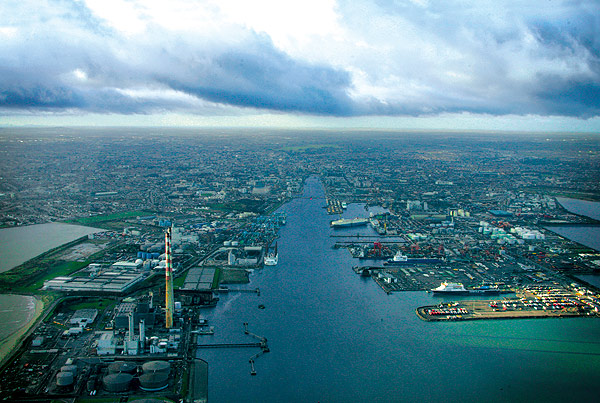
Dublin Port Company - a profitable state company
This is a smash-and-grab raid, redolent of a bankrupt Government philosophy. It is one thing to consider selling off the family jewels when, at least, the householder would still have access to the house. To sell off the ports is akin to the householder selling off the driveway, porch and front door to the house, then having to pay for the right to use them to enter the house in the future.
The Government has failed to develop a national ports policy. In the Progressive Democrat-fuelled era when privatisation, competition and profits were its driving force, the ports were moved out of direct State ownership and turned into semi-State competing bodies. Iarnrod Eireann was permitted to largely opt out of rail freight operations through the ports. Turned loose to compete against each other, the port companies followed no overall national policy for the benefit of the nation and now their future has been put in the hands of a group whose chairman advocates the sale of State companies and has already shown a lack of concern for the marine sector by shutting down the national sail training programme.
Aspects of journalism these days disappoint me after 45 years in the profession. Colm McCarthy who led Bord Snip Nua, is now chairing what is, effectively, ‘board privatisation,’ yet sections of the media seem largely to accept his views without question. I have not seen a lot of reportage which refers to his scathing opposition to the building of the DART, the Dublin Area Rapid Transport system, which he described as financial insanity and profligacy. Had those views been accepted, there would be no DART in Dublin, the consequences of which today are interesting to consider.
Privatisation of the ports should be strongly opposed. These are vital national assets. The lesson of selling-off Eircom has also, apparently, been forgotten by the Government.
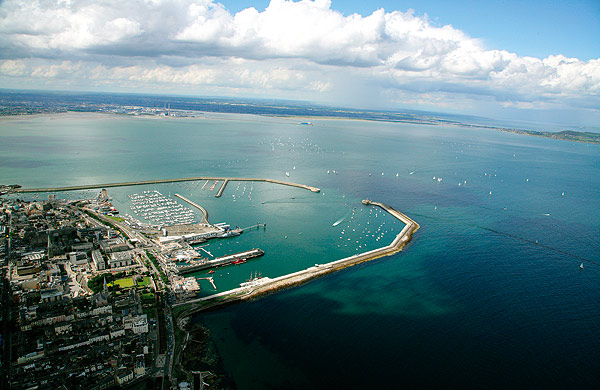
Dun Laoghaire Port on Dublin Bay
A Republic should be an entity in which there is open debate about public policy, not decision-making by elites. Flogging off our best assets, which is what this move by the Government is about, will not solve the nation’s problems. It is shocking to think that money from the sale of our vital transport arteries, the ports, could go to benefit those property speculators and banks which have bankrupted this nation.
This article is reprinted by permission of the CORK EVENING ECHO in which Tom MacSweeney writes maritime columns twice weekly. Evening Echo website: www.eecho.ie


























